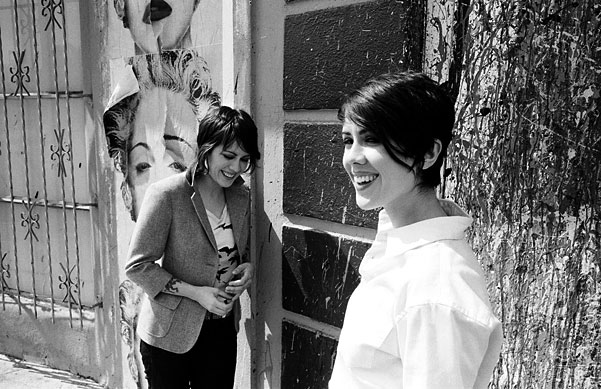

The other thing, too, from a business perspective, Tegan and I have been doing this for so long now that we’re not naïve, whimsical, “Oh, we’re just artists!” and hope that we keep having a fanbase. In some ways, even though, initially, it seems like we’re making something that might not be pleasing to our fans, in a lot of ways-it’s like the medicine, you know? "Here comes the medicine on the airplane." I’m like, “Guys! Long term, this is going to be better for you." Even if I’m really invested in a band, if I heard something new that sounds too similar to something I’ve heard before, that might make me not as invested in them, or I may just continue to be invested in the album that came before it. Part of that comes from being a music listener and fan myself. But the rabid, invested fans are the ones who, if we were to regurgitate or try to duplicate something we had done in the past, it may be meaningful or interesting to them immediately, but I don’t know if it would be as substantial as if we were to provide them with something new to chew on.

There’s a huge chunk of our fanbase that are a little bit less invested-“casual fans,” I guess-and those people are a little easier to please they’re there because there’s a collection of songs from each record that they’ve heard and really love. They’re the people who know you so well that being really authentic and emotional and striving for your best, that’s the only way to continue to keep them invested. It’s weird, I don’t know if I would describe it as a “safety net” because, in a lot of ways, your most loyal, rabid fans becomes the most difficult to please. Is there a comfort in that unconditional love that affords you the freedom to take more risks-like a safety net? You have over a decade of building this…almost rabid fanbase. I’m thinking more about how I’m going to get to a different level and how I’m going to respond to the music, and then I have a trust in me that maybe I know best for the audience. It’s funny there’re definitely some truth in some of what you say, but more than anything, I think it’s actually flipped now.

I was constantly thinking, “How does our band look? How does it sound?” Now that I’m older and have a better idea of what our project is or who our audience is, I think in some weird ways it becomes much more self-motivated-how do we push ourselves and take those risks that maybe we wouldn’t have on those previous records, when we were concerned with nurturing and servicing our core audience? Not that I don’t want to give our fanbase something that I think they’d love, but it’s more important right now to make sure that we’re pushing ourselves creatively and personally. Sara: Well, I would almost argue that when I was younger and writing, I was thinking much more about the audience-not necessarily because we had one, but just thinking how do we get one? In some ways, I was more aware of how our music might be perceived. How is it writing albums now, as opposed to when you first started more than 10 years ago and you were basically just writing for yourself? Now you’re writing with a fanbase in mind, knowing you have this loyal following that expects to hear a certain thing from you. You’ve spoken to the fact that you always want your fans to see you pushing yourselves forward, evolving, et cetera. Noisey: Heartthrob is a pretty big departure from your last releases.


 0 kommentar(er)
0 kommentar(er)
